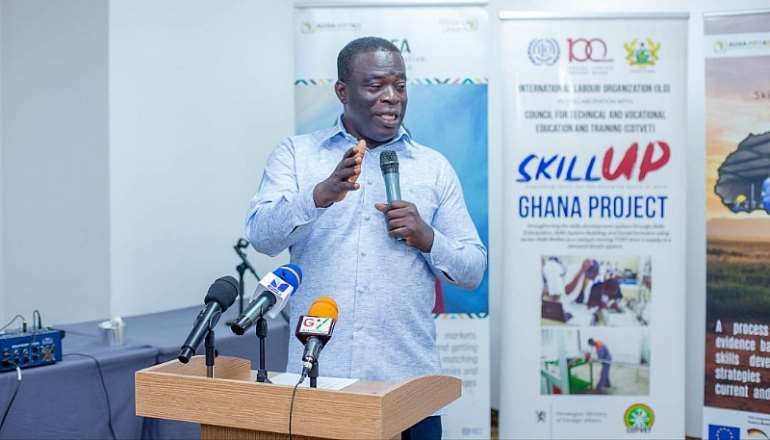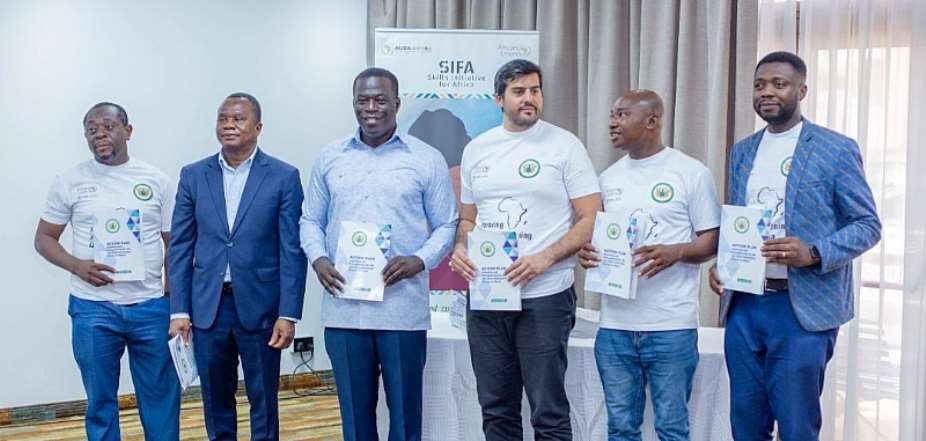The International Labour Organisation (ILO) through the Skills Initiative for Africa (SIFA) Skills Anticipation Programme component has collaborated with the Ministry of Employment and Labour Relations (MELR) to develop a National Action Plan to improve Labour Market Information System in Ghana.
The National Action Plan which will help strengthen Labour Market Information and Skills Anticipation System in Ghana was officially launched at an event in Accra on Wednesday, November 23.
In Ghana, the mismatch and imbalances between the demand and supply of skills contribute to costly economic inefficacies, which include among others, the difficult transition from education to productive employment, and under-utilisation of existing skills at the workplace, and limited portability of skills and qualifications across countries, regions and the continent.
Although the country over the years has had Labour Market Information System, it is outdated and not performing its function to deliver the expected outcome.
To help address what has become a huge problem, the ILO through the SIFA-Skills Anticipation Programme component conducted a study in Ghana in 2020 to map existing labour market information systems and practices to establish the extent to which the system has institutionalised skills anticipation as an integral part of the national labour market information system.
The research study aimed at mapping the existing data sources or providers, and reviewing current practices, capacities and institutional arrangements for labour market information and skills anticipation in Ghana.
The main objective was to inform the Skills Anticipation Component of the Africa Union Commission (AUC), which aims at facilitating the identification and anticipation of skills as an integral part of national labour market information systems (LMIS).
This was important to ensure that skills supply and skills demand in African labour markets can be matched effectively to help deal with the unemployment challenge and threats faced by respective recommendations governments for targeted the improvement AUC Member of existing States systems
The mapping exercise, therefore provided an overview of the Ghana Labour Market Information system, its data sources, its, capacities and institutional arrangements.
The report also highlighted the strengths and weaknesses of the current system including the fact the Country does not have an institutionalised process of anticipating labour market skills needs.
Subsequently, in 2021, a National Task Team was formed that worked to develop the National Action Plan for improving and strengthening Labour Market Information and Skills Anticipation Systems in Ghana.
It is that report that has now been launched to ensure the Ministry of Employment and Labour Relations has a functional labour market information system.
Delivering a keynote address at the launch event, the Minister of Employment and Labour Relations, Hon. Ignatius Baffour Awuah said he is happy with the work being put into the Nation Action Plan as it will guide policy formulation to benefit the entire country.
“Personally I embrace and accept this project, especially with the collaboration of the ILO who has been a virtual supporter in a number of our projects.
“We need to have information on the skills we have in the country, how many we can use and how many we can even export to other countries,” the Minister said while underscoring the importance of the Nation Action Plan.
 Hon. Ignatius Baffour Awuah
Hon. Ignatius Baffour Awuah
Hon. Ignatius Baffour Awuah in his address noted that in a digitalised world, it is very important to have data on skills to know how to face the constantly advancing world.
“It is about time we take advantage of the opportunities in the e-world. We can only do that when we have data on skills. Let’s work together and get the best out of what we are doing,” he said.
The Minister in an appeal called on experts working on the National Action Plan to work closely with stakeholders to get the best out of it to come up with a robust Labour Market Information System.
He told journalists that although having Labour Market Information System will not end unemployment in the country, it will help the country to come up with policies to address weaknesses or shortages in the system that handicaps people in the search for jobs.
In his address, the Officer in charge of the ILO Project Office in Ghana, Mr. David Marcos, explained that the National Action Plan which has been duly costed will serve as a resource mobilisation tool for the Ministry and other collaborators to be able to harness the needed resources towards the implementation of the recommended actions.
 Mr. David Marcos
Mr. David Marcos
According to him, the launch event is yet another success story of effective collaboration among ILO projects in the African region, adding that the SKILL UP Project and the SIFA Skills Anticipation project have been working in tandem to strengthen the skills anticipation system in Ghana.
“I am glad to note that the development of the National Action Plan is timely as the Ghana Jobs and Skills Project, funded by the World Bank, will support the implementation of key recommendations of this National Action Plan,” Mr. David Marcos stressed.
In his concluding remarks, he pledged the continued support of the ILO in pursuit of the noble dream of improving and strengthening the Labour Market Information System in Ghana with the view to promoting decent work and social justice.






 No constituency left without representation in Parliament — Afenyo Markin
No constituency left without representation in Parliament — Afenyo Markin
 Parliament approves $150million for Accra flood-proofing project
Parliament approves $150million for Accra flood-proofing project
 One-sided Parliament approves ministerial nominees as minority walks out
One-sided Parliament approves ministerial nominees as minority walks out
 It's 'impossible' to rig elections in Ghana - EC to NDC
It's 'impossible' to rig elections in Ghana - EC to NDC
 Bosomtwe: Violent rainstorm kills girl at Jarchie
Bosomtwe: Violent rainstorm kills girl at Jarchie
 Mahama takes bribe in every deal — Chairman Wontumi
Mahama takes bribe in every deal — Chairman Wontumi
 Late John Kumah goes home tomorrow
Late John Kumah goes home tomorrow
 Akufo-Addo's corrupt nature contributing to Special Prosecutor's hunt from offic...
Akufo-Addo's corrupt nature contributing to Special Prosecutor's hunt from offic...
 Watch how a ‘slay queen’ repented after having an encounter with Alpha Hour
Watch how a ‘slay queen’ repented after having an encounter with Alpha Hour
 Kennedy Agyapong and I are blood relatives — Bishop Obinim
Kennedy Agyapong and I are blood relatives — Bishop Obinim
